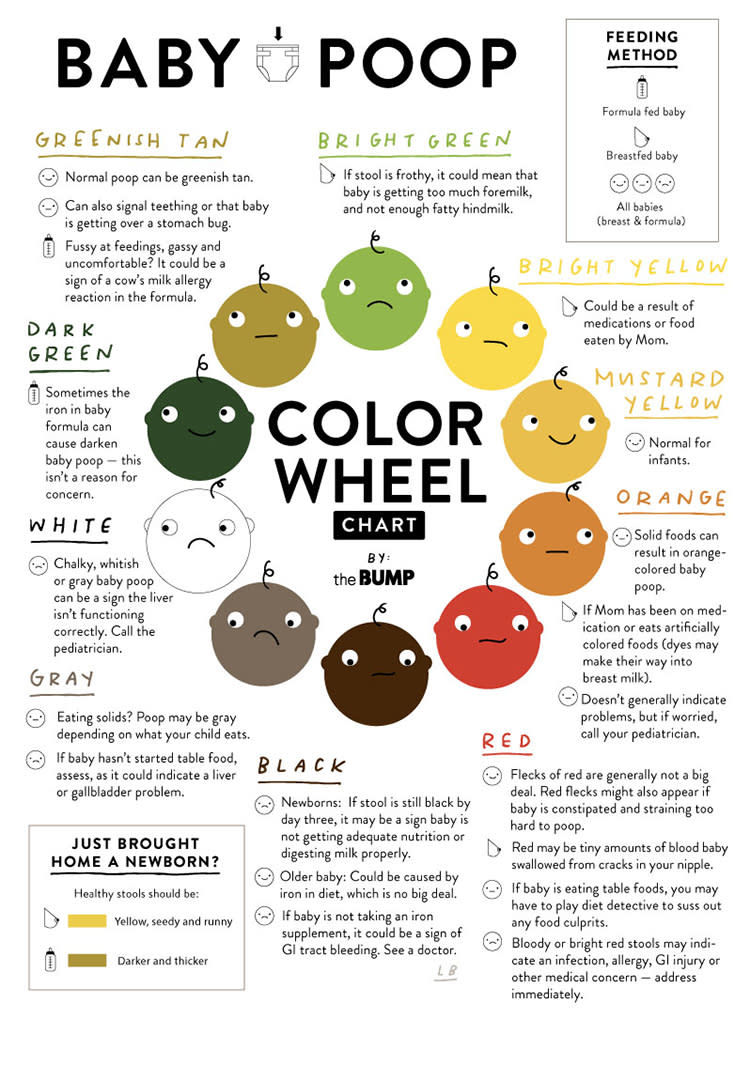Bowel Motions in Babies
The bowel motions of newborn babies are very variable, and depend on whether they are breast and/or formula feeding. Bowel motions change regularly during the first year of life.
Meconium
This is the bowel motion passed by babies in the first couple of days of life. It is a tarry green-black substance that builds up in the intestines during pregnancy. It is made up of bile, mucus, bowel wall and skin cells, secretions and amniotic fluid. It should first be passed in the first 24 hours of life. Colostrum acts as a laxative, helping to pass the meconium.
Breast Feeding Stools
Once feeding is established, the stools become looser and change to a green or brown paste before turning into a yellow, sloppy semi-liquid.
Bottle Feeding Stools
These are usually pale yellow or yellowish-brown, and tend to be bulkier and more formed than breast fed stools. They are also smellier.
Stooling Frequency
In the early weeks, babies often pass stools with each feed. Stooling frequency reduces with maturation of the gut and each baby develops his/her own routine, often stooling at a similar time(s) each day. The frequency is highly variable, ranging from 10 per day to 1 per week, even longer occasionally. Infrequent stooling does not necessarily mean that a baby is constipated, as long as the stools are no thicker than toothpaste, the baby is not particularly unsettled, and does not have excessive vomiting.
Solids
Stools change dramatically once solids are commenced, and depend on what is being fed, in terms of both texture and colour. Fibre-rich foods pass straight through, which is normal.
Diarrhoea
Diarrhoea refers to the passage of very runny frequent stools, which may be explosive. The causes include infection, medication (in the mother and/or baby), too much fruit/juice, or a sensitivity or allergy to a food. The passage of runny and foamy stools may indicate lactose intolerance, and may also occur with too frequent breast-feeding (with too much foremilk). Diarrhoea in breast-feeding babies is less common due to the inhibition of the bugs that cause it.
If diarrhoea persists, or if blood and mucus is noted, you should take your baby to be reviewed by your health nurse or GP.
Constipation
Constipation refers to the infrequent passage of hard stools, which may formed like an adult stool or like pellets. There may be excessive straining, and there may be blood streaks due to anal fissures (tiny tears in lining of anus). This is less common in breast-feeding babies. If this occurs, your health nurse or GP should review your baby.
In breast-feeding babies, a simple laxative called ‘Coloxyl’ may be helpful in softening the stools; it is available across the counter in pharmacies.
In bottle-feeding babies, adding an extra 10 to 20 mL of water to each bottle, which acts as a gentle laxative, usually effectively treats constipation.
In infants on solids, extra water and/or pureed prunes or apricots may also helpful.

